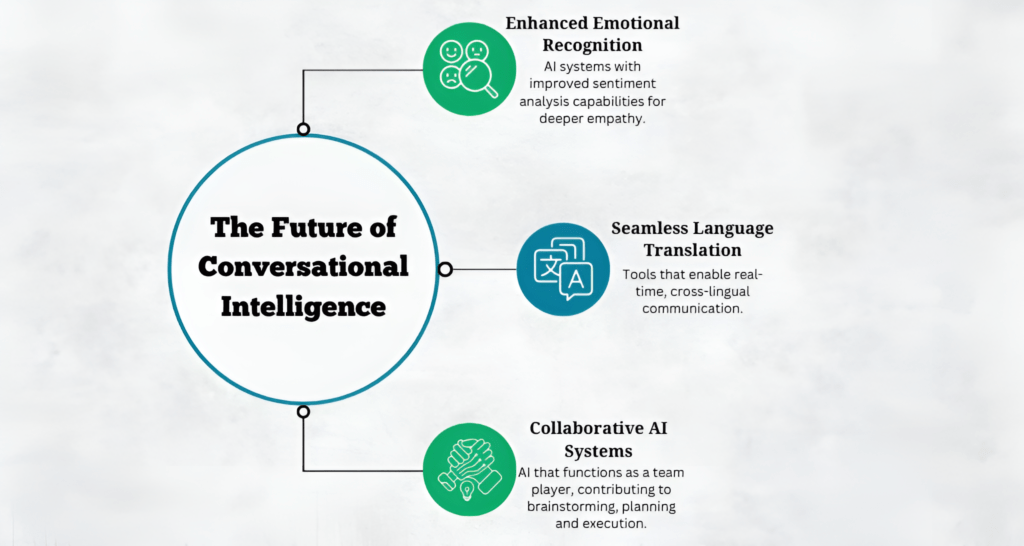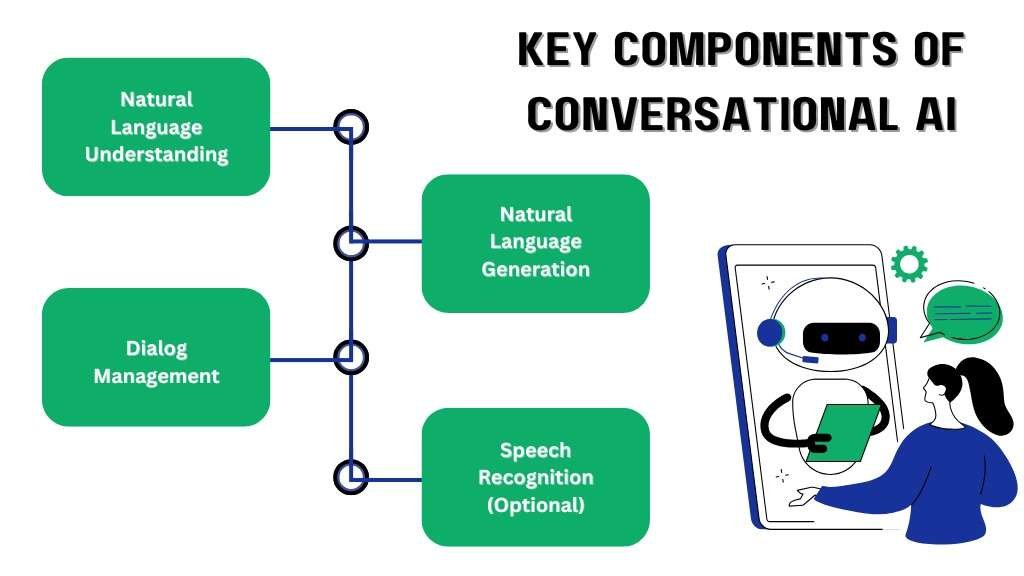Conversational Intelligence
Conversational intelligence is transforming the way people and technology interact by bridging the gap between advanced AI-driven tools and conventional communication. It makes it possible to have dynamic, context-aware discussions that change in response to human input and real-time data. Conversational intelligence paves the way for smooth cooperation and deep connections by fusing concepts like sentiment analysis, machine learning, and natural language understanding.

This cutting-edge method cuts across boundaries, improving interpersonal relationships, streamlining organizational procedures, and encouraging improved industry decision-making.
What is Conversational Intelligence?
- The capacity to have intentional, context-rich conversations that produce clarity and promote understanding is known as conversational intelligence. It involves more than just sharing knowledge; it involves building relationships, overcoming obstacles, and delivering outcomes.
- This idea applies not only to human communication but conversational intelligence is the capacity to have intentional, context-rich conversations that produce clarity and promote understanding by combining emotional intelligence, machine learning, and natural language processing (NLP).
Key Aspects of Conversational Intelligence
Contextual Understanding
A ability to understand and adjust to context is a defining characteristic of conversational intelligence. Understanding conversational nuances is essential for giving pertinent answers and sustaining engagement, whether in a professional setting or with a digital assistant.
Emotional Awareness
Conversational effectiveness depends on incorporating empathy into conversations, whether with AI or human partners. Sentiment analysis-enabled systems can detect emotions and modify their tone, resulting in more engaging and sympathetic interactions.
Continuous Learning
For the development of conversational intelligence, feedback loops are essential. Systems can enhance their answers and collaboration over time by refining their procedures based on analysis of past encounters.

How Conversational Intelligence Transforms Communication
Conversational Intelligence reshapes communication dynamics across various domains:
.
Enhances clarity in teamwork by reducing ambiguity and fostering productive dialogue.
Delivers personalized experiences by analyzing individual preferences and providing tailored solutions.
Equips leaders with tools to navigate complex conversations and inspire teams effectively.
Adaptive educational tools powered by Conversational Intelligence adjust to learners’ needs, fostering improved outcomes.
Benefits of Conversational Intelligence
⭐ Enhanced Decision-Making
Conversational intelligence enables people and organizations to make better decisions by combining user input and real-time data. It reduces miscommunications and guarantees that each exchange advances toward a certain goal.
⭐ Efficiency and Productivity
Conversational intelligence cuts down on time spent on repetitive work by automating common chats and providing real-time insights. Additionally, it gives teams useful insights that improve outcomes.
⭐ Strengthened Relationships
In both personal and professional contexts, trust is fostered via effective communication. Deeper connections are made possible by conversational intelligence, which improves understanding, empathy, and clarity.
⭐ Scalability and Consistency
Conversational intelligence-powered intelligent systems provide reliable, excellent interactions at any volume. This guarantees that companies can expand their communication initiatives without sacrificing quality.

The distinction between human and machine interactions will become increasingly hazy as a result of these developments, opening up possibilities for more impactful and intuitive communication.
Practical Applications of Conversational Intelligence
➡️ Improving Workplace Collaboration
Internal communications are streamlined by conversational intelligence solutions, which guarantee team alignment. These tools increase productivity and promote group success by removing frequent misconceptions.
➡️ Elevating Customer Service
Customer service is being revolutionized by chatbots, virtual assistants, and individualized responses, which guarantee quicker resolutions and greater satisfaction levels.
➡️ Optimizing Training and Development
Conversational intelligence is used by educational platforms to customize learning. AI instructors improve interest and retention by adjusting to the learner’s speed.
➡️ Supporting Leadership Goals
Leaders can leverage Conversational Intelligence tools to refine their communication styles, ensuring clarity and resonance when addressing teams or stakeholders.
Challenges in Implementing Conversational Intelligence
Despite conversational intelligence’s enormous potential, there are certain obstacles to overcome:

• Comprehending Complicated Queries
Artificial intelligence (AI) systems may have trouble understanding complex or nuanced language, requiring human assistance.
• Data Privacy Issues
Sensitive data protection is essential, particularly when working with organizational or personal data.
• Bias in Systems
Unintentional biases introduced by training datasets can affect dependability and fairness.
To guarantee success, organizations must handle these issues with sound plans, moral behavior, and frequent assessments.
Steps to Implement Conversational Intelligence
1. Specify your goals
Determine particular communication opportunities and challenges.
2. Choose Appropriate Tools
Select systems and platforms based on organizational requirements.
3.Educate and Train Teams
Give staff members the skills they need to effectively use Conversational Intelligence products.
4. Monitor and Optimize
To improve performance, evaluate results frequently, and make system adjustments.

Why Conversational Intelligence Matters
Fundamentally, conversational intelligence makes it possible to communicate more effectively, which is essential for success in all facets of life. It changes how people and organizations function by promoting understanding, strengthening bonds, and producing outcomes.
Adopting new technologies is only one aspect of embracing conversational intelligence; another is fostering a culture of understanding, empathy, and connection that endures in a world that is constantly changing.
